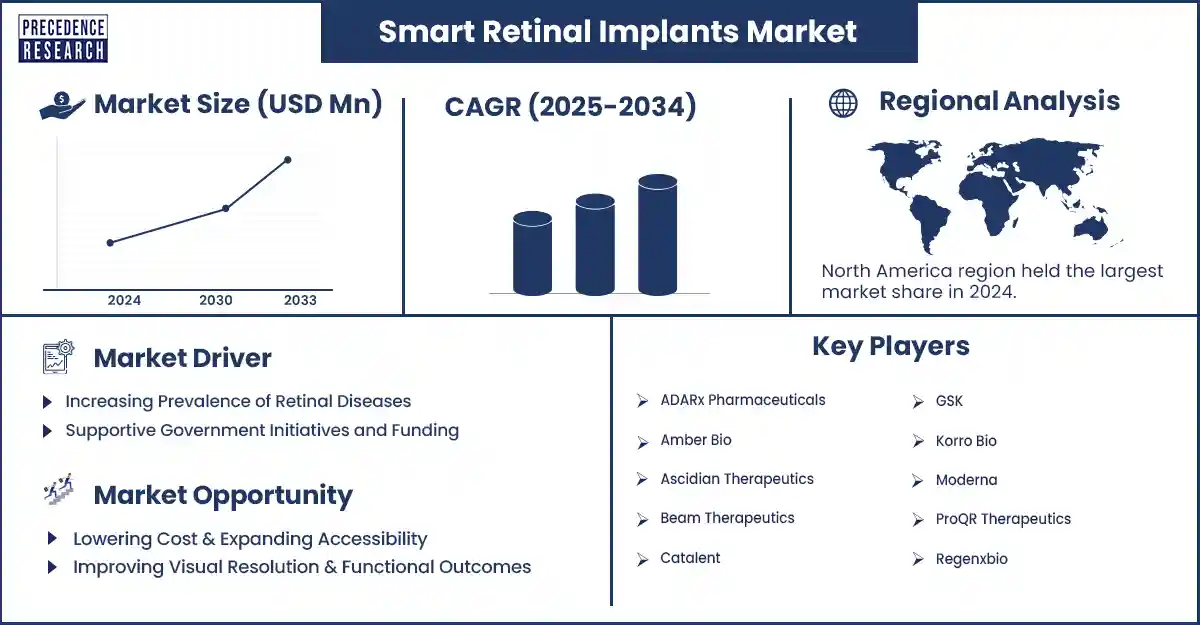Smart Retinal Implants Market Revenue and Forecasts by 2033
Smart Retinal Implants Market Revenue and Trends 2025 to 2033
The global smart retinal implants market growth is driven by rising prevalence of retinal diseases and advancements in implantable devices. The retinal implant market focuses on developing and commercializing devices aimed at restoring vision in individuals with severe vision loss due to conditions such as age-related macular degeneration (AMD), retinitis pigmentosa, and diabetic retinopathy. These devices, often referred to as bionic eyes or artificial retinas, create visual sensations.

Key Drivers Supporting the Smart Retinal Implants Market
The global smart retinal implant market is experiencing rapid growth, fueled by the increasing prevalence of retinal diseases like AMD and retinitis pigmentosa. This rising demand is further supported by ongoing technological advancements in retinal implant technology, resulting in more effective and comfortable artificial retina systems. Additionally, a growing geriatric population worldwide, alongside increased investment in research and development, is driving market expansion.
Segment Insights
- By implant type, the subretinal implants segment held the leading position in the market because it utilizes the retina's natural processing pathways, potentially providing more stable and retinotopically accurate vision.
- By technology, microelectrode array technology dominates the market as it incorporates flexible materials and high-density electrodes, allowing for more precise stimulation of retinal cells, which leads to better visual resolution and improved patient outcomes.
- By materials, biocompatible metals and polymers represented the largest segment due to their essential properties like biocompatibility, flexibility, and conductivity, which are crucial for devices interacting with sensitive eye tissues.
- By power sources, the wireless energy transfer (WPT) segment is predominant in the Smart Retinal Implants Market as it eliminates the need for invasive surgeries to replace or recharge batteries, thereby enhancing patient safety and reducing risks associated with internal batteries.
- By disease indication, the retinitis pigmentosa segment led the market by providing a solution for severe vision loss resulting from the progressive degeneration of photoreceptor cells in patients who have lost natural light perception.
- By end user, hospitals and specialty clinics accounted for the largest segment, offering the necessary surgical capabilities, specialized ophthalmologists, and established post-operative care.
- By distribution channel, the direct sales segment dominates the market due to the necessity of direct interaction between manufacturers and specialized healthcare providers for proper installation, training, and patient support, which ensures safety and efficacy.
Smart Retinal Implants Market Coverage
| Report Attribute | Key Statistics |
| Quantitative Units | Revenue in USD million/billion, Volume in units |
| Largest Market | North America |
| Base Year | 2024 |
| Regions Covered | North America, Europe, Asia-Pacific, Latin America, and Middle East & Africa |
Regional Insights
North America led the market due to its advanced healthcare infrastructure, strong research and development focus, high healthcare expenditure, and favorable reimbursement policies. This region also has a high prevalence of vision-threatening diseases like AMD and retinitis pigmentosa. Healthcare authorities in North America often promote the development and adoption of advanced prosthetic devices through supportive regulatory frameworks.
Asia Pacific region is the fastest-growing market, driven by its large and aging population, the increasing prevalence of age-related diseases, rapid healthcare infrastructure expansion, growing awareness of advanced eye treatments, and rising healthcare expenditure. Increased research and development activities, particularly in countries like China, Japan, and India, are fostering innovation and technological advancements in retinal implant technologies.
Smart Retinal Implants Market Key Players
- Second Sight Medical Products, Inc.
- Retina Implant AG
- Pixium Vision SA
- Bionic Vision Technologies
- Nano Retina, Inc.
- Intelligent Implants GmbH
- iBionics
- Optobionics Corporation
- VisionCare Ophthalmic Technologies
- Ocumetics Technology Corporation
- Nidek Co., Ltd.
- Boston Scientific Corporation
- Medtronic plc
- Alcon (Novartis)
- Johnson & Johnson Vision Care, Inc.
- Zeiss Group
- Ophthorobotics AG
- Gensight Biologics
- LambdaVision, Inc.
- Neurotech Pharmaceuticals, Inc.
Recent Development
- In March 2025, Vivani Medical, Inc. announced its intention to spin off Cortigent, Inc., a division that develops brain implant devices to help individuals recover critical bodily functions. This strategic move aims to create two focused companies dedicated to driving current and future value in their respective therapeutic areas of expertise. (Source: https://investors.vivani.com)
Get this report to explore global market size, share, CAGR, and trends, featuring detailed segmental analysis and an insightful competitive landscape overview @ https://www.precedenceresearch.com/sample/6776
You can place an order or ask any questions, please feel free to contact at sales@precedenceresearch.com |+1 804 441 9344